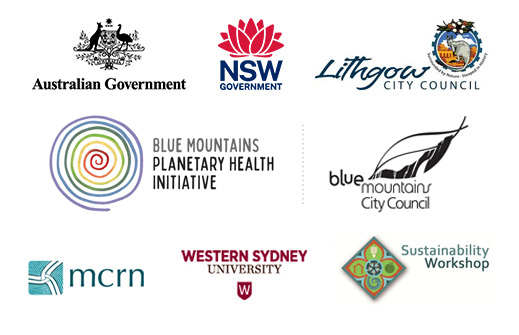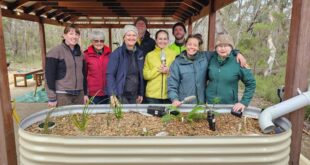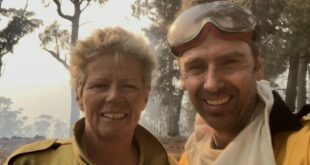
Shaun Watson with Peggy and Flossy in the Kanimbla. (Photo: Hamish Dunlop)
Story and photos by Hamish Dunlop
Shaun Watson is the NSW Chair of Doctors for the Environment Australia. At his home-away-from-home in the Kanimbla Valley, he talks about his motivation to fight for the planet, the health impacts of fossil fuels and simple things we can do to make a difference.
Key Points:
- Doctors for the Environment Australia exists because human health is inextricably linked to environmental health.
- The organisation is issues–based: from bushfires and floods to mental health and biodiversity.
- DEA’s actions demonstrate grassroots actions and like-minds can truly make a difference to planetary health.
I’m driving down a winding dirt track in the Kanimbla Valley. As I come around a bend, an excited Labrador romps along beside the car. I slow down, enough for a determined dachshund to catch up. Where the dirt track peters out, I find a small dwelling nestled in the landscape.
Shaun is a neurologist who works in Randwick and Blacktown. He’s also the NSW Chair of Doctors for the Environment Australia (DEA). On my drive down, I’ve been imaging someone in a crisp buttoned shirt, casual slacks and maybe R.M. Williams boots.
To my surprise, the man who greets me is dressed in worn pants. His coarse woollen jumper is peppered with colourful darns. I am struck by the softness of his face as he turns me a generous smile. “Come on in,” he says, “Tea?”
The house is filled with art and books. It’s well lived in. “Not over cleaned,” Shaun says. The low profile, off-grid dwelling runs on three solar panels and some old car batteries. There is a cottage garden with fruit trees and a rambunctious vegetable patch. Fire screens sit ready to cover the doors and windows, and a pump and hose can be connected to the dam.
“Home is where the heart is,” Shaun says. “You’ve got to be connected to the world to want to fight for it.”

The main room with Shaun making tea. (Hamish Dunlop)
Climate action from a place of love
At the height of the 2019/20 fires, family and friends were gathered in Sydney. It was the 30th birthday celebration of his and his wife Kati’s eldest daughter. The air was smoky and there was a pervasive eerie light. “My daughter Chloe was pregnant at the time and spent most of the party in her room crying, not wanting to bring a new life into this world. It was absolutely devastating for us.”
If there was a seminal moment that galvanised his resolve to fight for people and the planet, this was it. He says at some stage, the penny dropped about being a doctor.
“I realised that it gave me a kind of trusted, respected voice. Even though I’ve been a doctor for a very long time, I wasn’t aware that there was a particular organisation in Australia that combined medicine with environmental concerns.” After some Googling in 2020, he found Doctors for the Environment Australia.

Get to know a person by the books they read. (Hamish Dunlop)
DEA in Wentworth, Sydney
Not long after signing up, he received a call from the then national chair, Dr John Van Der Kallen. DEA had decided to run a campaign in five electorates leading up to the last Federal election. One of those electorates was Wentworth in Sydney. This is where Shaun and Kati live when they’re not in the Kanimbla.
Shaun says, as with all DEA activities, the campaign was apolitical and nonpartisan. “DEA is an issues-focused organisation,” he says. “The campaign was focused on raising awareness of climate change: its health impacts and the health dimensions. We engaged with politicians from across the political spectrum.”
One of the activities DEA undertook was collecting signatures in support of positive climate change policies. “We went to places like the Bondi Markets and the mall in Bondi Junction. People signed postcards in support of positive action on climate change. Then we delivered those postcards to politicians including Dave Sharma, the Liberal MP for Wentworth at the time.”
Allegra Spender was the independent MP who was elected. One of her key policies is the need for urgent action on climate change. Shaun’s partner/wife Kati was also heavily involved in the campaign. Shaun recalls that it was a baptism of fire. “We’d gone from stationary to full tilt running in a matter of months.”

Home is where the heart is: a content Flossy. (Hamish Dunlop)

Objects to live by. (Hamish Dunlop)
Doctors for the Environment Australia
DEA is a registered charity and run predominantly by volunteers. In NSW, Shaun is very active along with around 30 others. “Among many things, we write submissions to organisations and politicians,” he explains. “Sometimes we are invited to take part in inquiries relating to human and environment health. DEA’s reason for being is that human health is inextricably linked to environmental health.”
The focus for this year is raising awareness about the health impacts of fossil fuels. “It’s an issue that needs to be addressed urgently,” Shaun explains. “Burning fossil fuels produces CO2 that is a greenhouse gas which warms the atmosphere. This climate pollution has wide ranging health consequences associated with increased heat, from increased mortality to mental health. The combustion of fossil fuels also damages human health through the tiny particles and other gases produced, such as nitrogen dioxide.”
He’s hoping the campaign will change people’s behaviour at all levels of government and inform individuals too. “Part of what we’re trying to do is take away the social license for gas, oil and coal,” he says. “All of us at DEA think we can change the world. We’re going to do everything in our power to do so.”

Shaun and Flossy with the house looking west. (Hamish Dunlop)
What we can we do for human and planetary health
Shaun says there are a variety of things we can do to support the health of humans and the environment. He says there are often co-benefits to positive actions: for the environment, health and our finances. He points to simple lifestyle changes such as cycling, or taking public transport when you can. Eating one less meat meal a week is another example.
Voting is something else Shaun and Kati think is important. “Voting for people who have progressive climate policies is something we can all do,” Shaun says. “Moving money is a powerful thing too. There are banks and super funds that are focused on ethical, climate-related issues and it’s not difficult to switch.”
“Engaging with like-minded people is another potent way to act,” he expounds. “I did feel powerless and depressed. Finding DEA has absolutely transformed my life and my mental health. There’s plenty of scientific evidence that support the benefits of joining/belonging to a community of like-minds,” Shaun says.
“We’re living the motto, ‘Always go to the party’,” says Kati. “For us, it means always putting our hand up for anything that might make a difference. Literally, you never know where a conversation with someone might lead.”
“You can engage with your local member by writing or calling them,” Kati continues. “This can raise their awareness about what you think is important. Donating to organisations that are fighting for positive climate action is another way to contribute. It doesn’t have to be much, but everything counts.”
Shaun thinks that climate justice needs to be a foundational principle of how we approach climate change. “The message is that everyone must be taken along. Planetary health is about all people. Engaging with First Nations peoples is fundamental to this. We’re committed to recognising Australia’s unceded lands, respecting its peoples and actively listening.”

Sunset in the Kanimbla. (Hamish Dunlop)
Starting somewhere
As we finish up our conversation, Shaun reflects on the psychological effects of the climate challenge. “For some reason, we seem to struggle to find hope and the capacity to take action in the face of climate change,” he says. “It’s like we’ve gone from denial to despair without going through the phase where hope can be realised in our positive actions.”
“As with everything in life, we have to start somewhere,” he considers. “We have to start right where we find ourselves and work with what we have. No matter how many degrees the planet warms, we need to allow ourselves the chance to make our contribution and never forget that every 0.1 degree matters.”
Take Action:
- Grassroots actions and like-minds can truly make a difference to planetary health.
- We can all contribute!
- Doctors for the Environment Australia fact sheets can be found here on subjects ranging from bushfire and floods, to traffic emissions, trees and mental health.
Share this article:
This story has been produced as part of a Bioregional Collaboration for Planetary Health and is supported by the Disaster Risk Reduction Fund (DRRF). The DRRF is jointly funded by the Australian and New South Wales governments.

More from around the region
@ bluemountainsplanetaryhealth . Apr 2

@ bluemountainsplanetaryhealth . Apr 1

In our `How to Build a Survival Garden in the Blue Mountains` workshop on Saturday 5 April, we`ll be starting an Upper Mountains Seed Saving group and sharing seeds, tubers, recipes for more unusual foods, and information about the many ways we can create more food system diversity and resilience. Learn about skirret, salsify, collards, cardoons, sea kale, Good King Henry, mangel wurzel, oca, yacon and more. Places are limited so bookings essential here (link in profile) : bit.ly/4kVAUA8
#foodsystems #foodsecurity #fooddiversity #foodresilience #biodiversity #planetaryhealth #healthydiet #plantbased #katoomba #bluemountains
@ bluemountainsplanetaryhealth . Mar 31

Was that a frog or cricket you heard? Check out our video matching the photos of the 20 frogs of the Blue Mountains Mountains with their calls so you can learn the difference. View our exhibition, learn how to use the FrogID app, and how to build a frog pond and frog hotel, at our workshop this Saturday 5 April at 9am. Bookings via via link in profile. You can view our full video on YouTube (link in profile). Subscribe for more great content. #frogs #bluemountainsfrogs #planetaryhealth #katoomba #frogcalls #exhibition #workshop
@ bluemountainsplanetaryhealth . Mar 30

A huge thank you to the Blue Mountains Interfaith Group for organising an inspiring afternoon that brought community together and renewed our sense of connection, hope, wonder, shared purpose and commitment to care for our extraordinary planet. We had a full house with the Frogs of the Blue Mountains looking over our shoulders! Next Saturday 5 April we`ll be launching Saturday morning T`ai-chi and Qigong which will continue on the first Saturday of every month. Bookings essential here (link in profile): bit.ly/3Rn9RzY #interfaith #hope #wonder #commitment #connection #community #planetaryhealth #katoomba #bluemountains #taichi #qigong
@ bluemountainsplanetaryhealth . Mar 29

@ bluemountainsplanetaryhealth . Mar 29

@ bluemountainsplanetaryhealth . Mar 28

Our Planetary Health Newsletter is out! Read it here https://bit.ly/4l7sC89 (link in profile) to find out how Planetary Health has been at the core of Blue Mountains City Council`s Sustainability Model and Map for Action for 25 years and what it means; watch our `We Are Nature` video and our latest video on the Frogs of the Blue Mountains and all their calls; read about how we`re focusing on what connects us, not what separates us, at the Interfaith Gathering this Sunday 30 March; learn how you can take action for Planetary Health on Saturday 5 April with T`ai-chi & Qigong, workshops on the Frogs of the Blue Mountains and building Survival Gardens; and participating in Planetary Health Bushcare. There`s also still time to apply for our Conference and Events Organiser position at the Planetary Health Centre. You can subscribe to receive the newsletter at any of our local news sites, like www.katoombalocalnews.com (link in profile)
@ph_alliance
#planetaryhealth #sustainability #jobs #taichi #qigong #survivalgardens #frogs #bluemountains #katoomba #mapforaction #sustainabilitymodel #wearenature #interfaith #bushcare #community #action
@ bluemountainsplanetaryhealth . Mar 27

Did you know that this is a Screaming Tree Frog, and that there are at least 20 different known frogs in the Blue Mountains? Join our workshop on Saturday 5 April to view all of them at the Planetary Health Centre, and learn how to use the FrogID app to record and identify their calls. We’ll also be demonstrating how to build a pond or frog hotel to increase habitat for them. Reserve your spot in the workshop here (link in profile):
https://www.eventbrite.com.au/e/the-frogs-of-the-blue-mountains-tickets-1281801285149
Photo: Alexander Dudley
@frogidaus
#frogs #bluemountainsfrogs #screamingtreefrog #planetaryhealth #skillshare #habitat #froghabitat #frogcalls #katoomba #bluemountains
@ bluemountainsplanetaryhealth . Mar 26

We are starting Saturday morning T`ai-chi and Qigong at 8am on Saturday 5 April at the Planetary Health Centre.
Places are limited so bookings essential here (link in profile): https://bit.ly/3Rn9RzY
T`ai-chi and Qigong routines can increase mobility and strength, improve immunity and help build an inner calm - a great way to start the weekend!
The monthly practice at the Planetary Health Centre is suitable for people with a little or lots of experience. Join us on the 1st Saturday of the month at 8 am, to nourish your body, mind and spirit or 3 treasures (in Chinese, Jing, Chi and Shen, or San Bao)
Virginia Field is an experienced trainer of T`ai-chi/Qigong, with more than 30 years experience.
This activity is the first in a full day of Skillshare activities at the Centre:
8am T`ai-chi and Qigong
9am-3pm Fashion Upcycling
9am Frogs of the Blue Mountains and how to help them
10am-1pm How to Build a Survival Garden in the Blue Mountains
1.30-4.30pm Planetary Health Bushcare
Contact Lis on 0407 437 553 for more information.
#taichi #qigong #innercalm #mobility #personalhealth #planetaryhealth #katoomba #bluemountains #planetaryhealthcentre
@ bluemountainsplanetaryhealth . Mar 25

Bookings are now open for our very popular Upcycled Fashion Program on Saturday 5 April. Learn how to use a machine, how to mend, sew, adjust and remodel clothes, and how to create your own patterns to use up all that fabric you`ve been collecting! If you`re interested in earning money, you can also be supported to become part of the Repair Network helping keep textiles out of landfill. Places are limited so get in early to book your place here (link in profile):
https://bit.ly/4c2Go85 #upcycling #upcycledfashion #skillsharesaturday #planetaryhealth #keepingtextilesoutoflandfill #skillshare #katoomba #bluemountains #sustainability #socialenterprise
@ bluemountainsplanetaryhealth . Mar 24

We are looking for a Professional Conference & Events Organiser to join our team at the Planetary Health Centre! If you`re keen to make a difference and demonstrate how events can be run sustainably and help inspire change, we`d love you to work with us! Applications close 30 March. Scroll down to learn more here (link in profile): https://www.bmcc.nsw.gov.au/jobs and ring Lis on 0407 437 553 if you`d like to discuss. Please share if you know anyone who might be interested! #jobs #hiring #conferenceorganiser #eventsorganiser #planetaryhealth #careers #inspiringchange #sustainableevents #applynow
@ bluemountainsplanetaryhealth . Mar 23

Would you know what to prioritise if you needed to build a survival garden in the Blue Mountains? Do you know how families survived and stayed healthy during the Great Depression? What would you need to grow to provide all your nutritional needs on a plant based diet? How can you have fruit all year round in a cold climate? Have you grown salsify, skirret, yacon or American Ground Nut and would you know how to cook them? We’ll answer all these questions in our ‘How to Build a Survival Garden Workshop’ at the Planetary Health Centre from 10am to 1pm on Saturday 5 April. We’ll discuss how we can work together to make our local food system healthier and more resilient and we’ll have planting guides, recipes and some seeds, bulbs and tubers available to get you started. Places are limited so bookings essential here (link in profile): https://bit.ly/4kVAUA8
#growyourown #survivalgarden #salsify #skirret #yacon #oca #bluemountains #permaculture #planetaryhealth #seedsaving #foodsecurity #healthyfood #gardening #communityfarming




